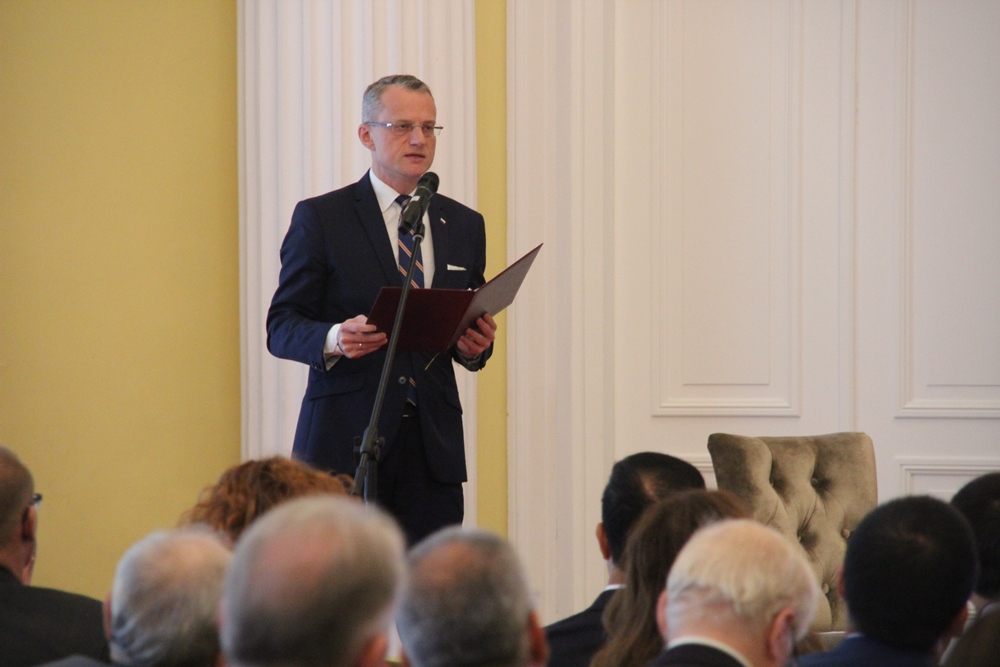14.09.2017, 00:00

08:45-09:00 Welcoming Coffee
09:00-09:15 Opening Remarks
- Sławomir Dębski, Director, Polish Institute of International Affairs
- Huang Ping, Secretary General of the China-CEEC Think Tanks Network (CASS), Director General of Institute of European Studies, CASS
- Xu Jian, Ambassador of China to Poland
09:15-10:00 Keynote Speech
- Marek Magierowski, Undersecretary of State in the Ministry of Foreign Affairs of the Republic of Poland
10:00-11:30 Session 1: A New Opening/Stage of “Belt & Road” Initiative?
Session will identify possible changes after this year’s “Belt & Road” international forum and their influence on possible cooperation. What is new after the forum? Is “Belt & Road” now more or less clear? How can the potential for China-CEEC cooperation be further explored under the “Belt & Road” framework? Specific emphasis will be placed on implications for CEE countries and the 16+1 format.
Speakers:
- Radosław Flisiuk, Head of China Division, Ministry of Foreign Affairs of the Republic of Poland
- Kong Tianping, Senior Research Fellow, IES, CASS (confirmed)
- Dragana Mitrovic, Director, Centre for Asian and Far Eastern Studies, University of Belgrade
- Renata Mudrova, Department of International Business, Metropolitan University Prague
Chair: Justyna Szczudlik, Asia-Pacific Programme Coordinator, Polish Institute of International Affairs
11:30-11:45 Coffee Break
11:45-13:15 Session 2: Future of 16+1 Format after Five Years of Existence
Session will describe the current stage of the “16+1” initiative, and identify trends, chances, and challenges ahead of the coming summit in Budapest. Proposals for the Budapest summit are welcomed, especially regarding how to push forward concrete cooperation in investment and projects under “16+1”. Panelists will try to explain the possible synergy between “16+1” and “Belt & Road”, as well as links and differences between these two initiatives. Will the 16+1 Format melt into “Belt & Road” or stay as an independent platform of China-CEE cooperation? Achievements to date and challenges will be discussed.
Speakers:
- Marcin Przychodniak, China Analyst, Polish Institute of International Affairs
- Liu Zuokui, Director of Department of CEE Studies, IES, CASS
- Agnes Szunomar, Research Fellow, Academy of Sciences in Budapest
Chair: Cui Hongjian, Director of Department of European Affairs, CIIS
13:15-14:15 Lunch
14:15-15:45 Session 3: Implications of the “Belt & Road” Initiative for the Global Order
Session will describe the current global order, including main conflicts, alliances, and possible scenarios in the context of China’s influence and its main foreign policy tool (BRI). Panelists will identify the main opponents of the initiative and their arguments, and either negate or accept the arguments. Is “Belt & Road” a mean to build a network of partners to lift up China’s worldwide influence?
Speakers:
- Dominik Mierzejewski, Department of East Asia Studies, University of Łódź
- Zhao Jianglin, Director of Economic Studies, NIIS, CASS
- Una Aleksandra Berzina-Cherenkova, Head of Riga Stradins University Confucius center; Associate Researcher, Latvian Institute of International Affairs
- Liisi Karindi, Research Fellow, Asian Research Centre
Chair: Damian Wnukowski, Analyst at International Economic Relations and Energy Policy Programme, Polish Institute of International Affairs
15:45-17:15 Session 4: Is Money the Key? Financing Schemes under “Belt & Road” Initiative
Session will focus on the financing of projects under “Belt & Road” Initiative, China’s involvement, and ways of participation. Panelists will also elaborate on the role of AIIB, China’s state banks (their ability to borrow money in connection with their current liquidity and bad loans status), and possible foreign actors (ADB, IMF, World Bank).
Speakers:
- Andrzej Szewczyk, Deputy Director, Department of Economic Promotion, Polish Investment and Trade Agency (tbc)
- Wang Yongzhong, Director of International Energy Studies, IWEP, CASS
- Wolf Csaba, Regional China Director, Deloitte in Budapest
- Petrisor Gabriel Peiu, Director, The Black Sea University Foundation in Bucharest
Chair: Una Aleksandra Berzina-Cherenkova, Head of Riga Stradins University Confucius center; Associate Researcher, Latvian Institute of International Affairs
17:15-17:45 Closing Remarks


